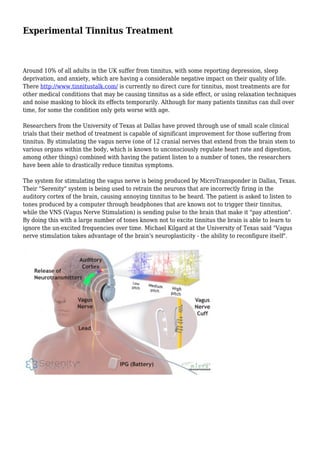
Experimental Tinnitus Treatment
- 1. Experimental Tinnitus Treatment Around 10% of all adults in the UK suffer from tinnitus, with some reporting depression, sleep deprivation, and anxiety, which are having a considerable negative impact on their quality of life. There http://www.tinnitustalk.com/ is currently no direct cure for tinnitus, most treatments are for other medical conditions that may be causing tinnitus as a side effect, or using relaxation techniques and noise masking to block its effects temporarily. Although for many patients tinnitus can dull over time, for some the condition only gets worse with age. Researchers from the University of Texas at Dallas have proved through use of small scale clinical trials that their method of treatment is capable of significant improvement for those suffering from tinnitus. By stimulating the vagus nerve (one of 12 cranial nerves that extend from the brain stem to various organs within the body, which is known to unconsciously regulate heart rate and digestion, among other things) combined with having the patient listen to a number of tones, the researchers have been able to drastically reduce tinnitus symptoms. The system for stimulating the vagus nerve is being produced by MicroTransponder in Dallas, Texas. Their "Serenity" system is being used to retrain the neurons that are incorrectly firing in the auditory cortex of the brain, causing annoying tinnitus to be heard. The patient is asked to listen to tones produced by a computer through headphones that are known not to trigger their tinnitus, while the VNS (Vagus Nerve Stimulation) is sending pulse to the brain that make it "pay attention". By doing this with a large number of tones known not to excite tinnitus the brain is able to learn to ignore the un-excited frequencies over time. Michael Kilgard at the University of Texas said "Vagus nerve stimulation takes advantage of the brain's neuroplasticity - the ability to reconfigure itself".
- 2. The first trial carried out in Belgium at the University Hospital Antwerp was on 10 patients, each with a stimulation electrode placed directly on their vagus nerves. The treatment sessions lasted for 20 days, with each person undergoing around 2.5hours of treatment a day. The group was chosen based on experiencing tinnitus for at least a year, without other treatments having any noticeable effect. Half of the participants noted a large improvement, with 4 of them gaining a 26dB reduction in perceivable tinnitus loudness. The other participants were suspected to be under the influence of other drugs limiting the effectiveness of the vagus nerve stimulation. The full results of the trial can be found here. A secondary, larger clinical trial is set to take place in the US through the University of Texas at Dallas and 3 other universities: http://www.utdallas.edu/~sxv140030/clinical_trial/ Experience tinnitus and other mysymptom.org types of hearing loss for yourself using Solent Acoustics simulations, found here. About these ads